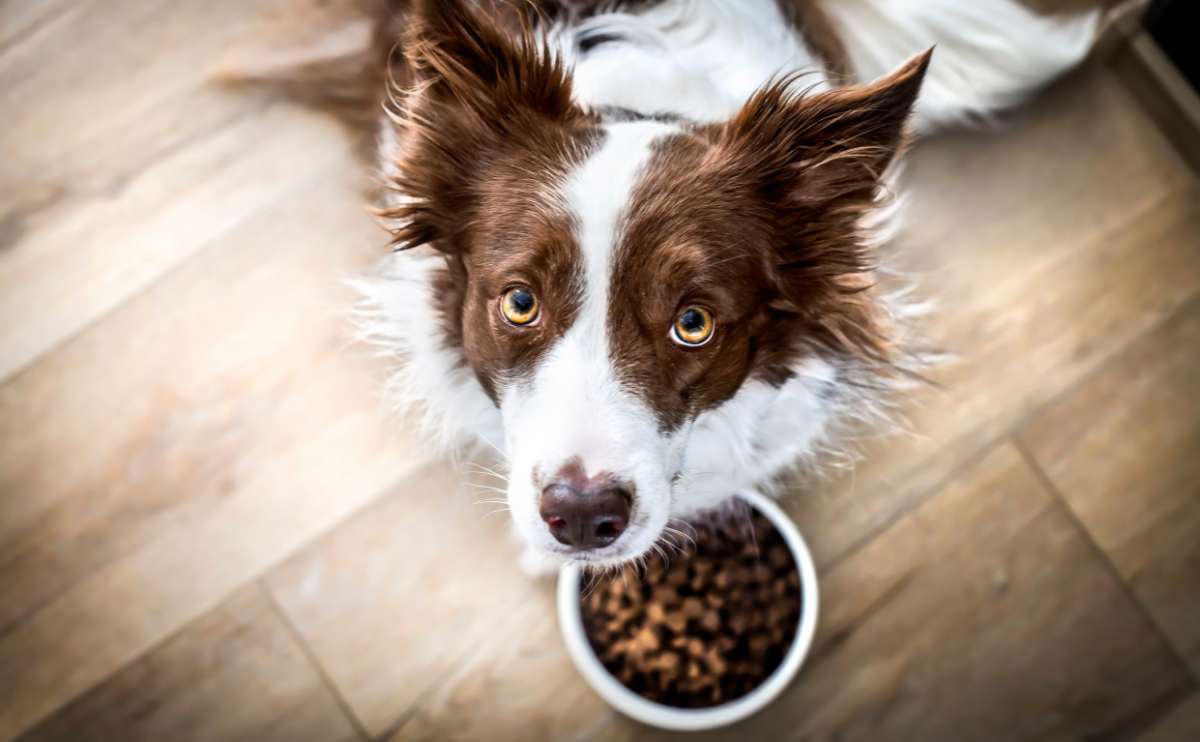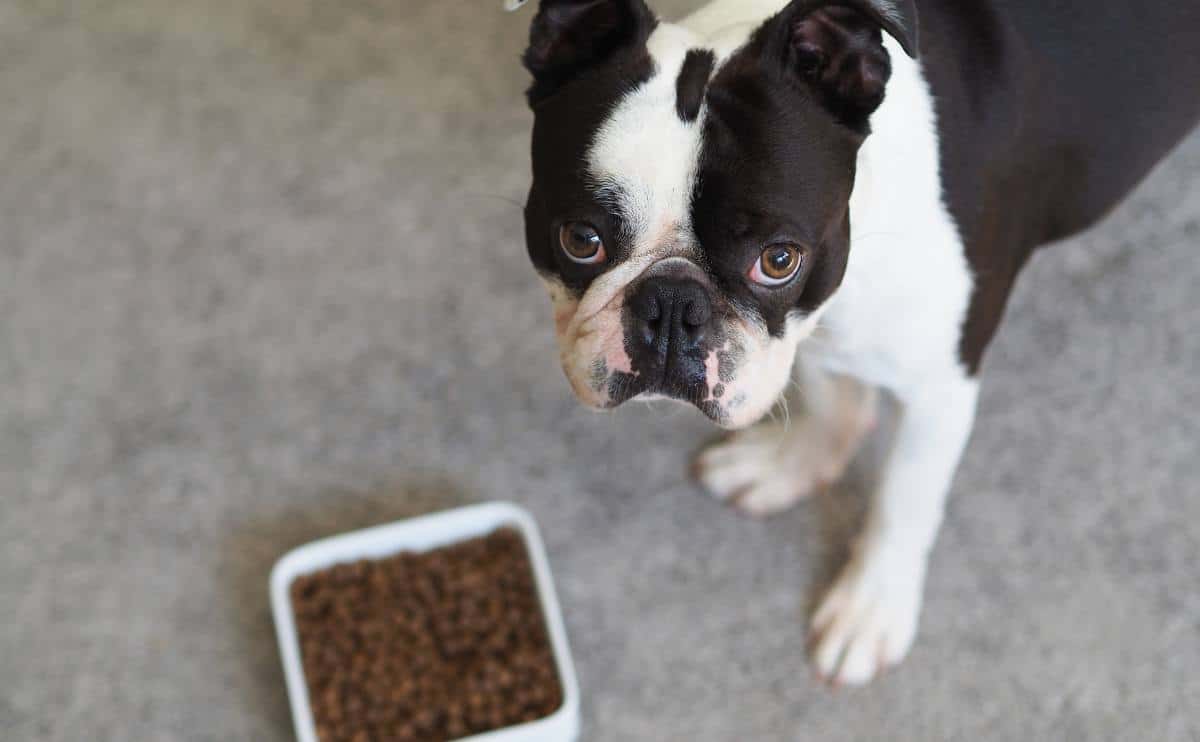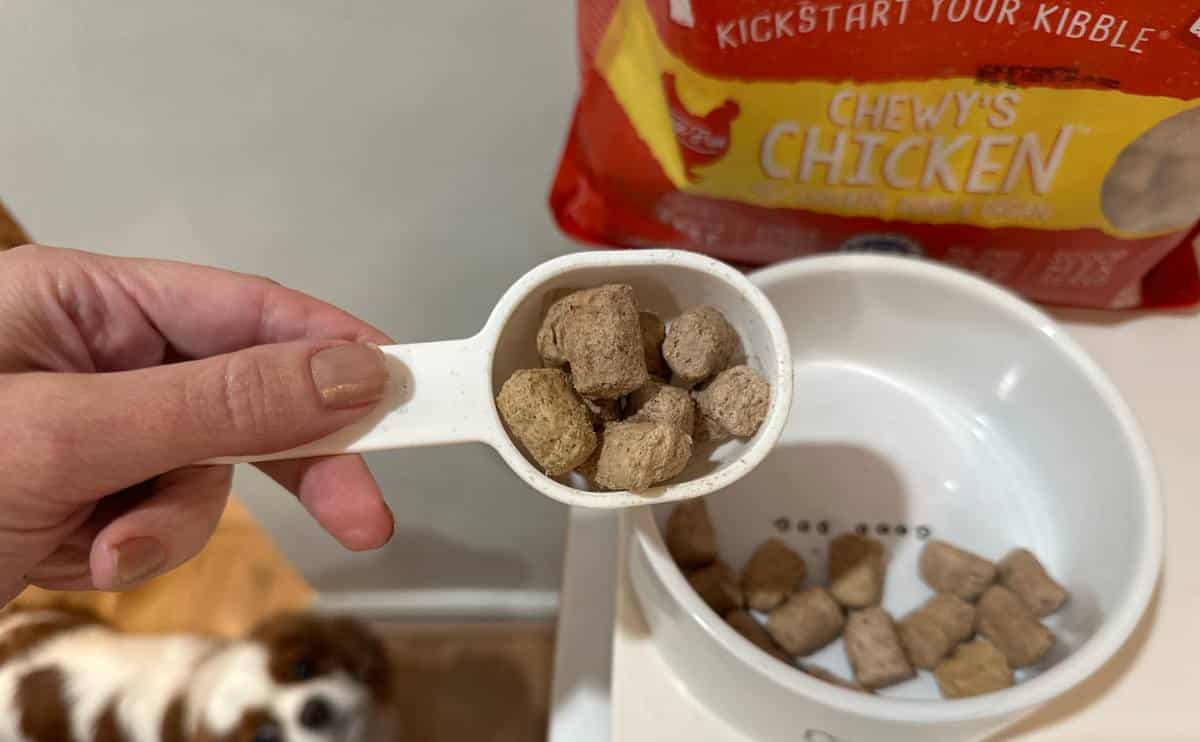When you purchase through links on our site, we may earn a commission. Here’s how it works.
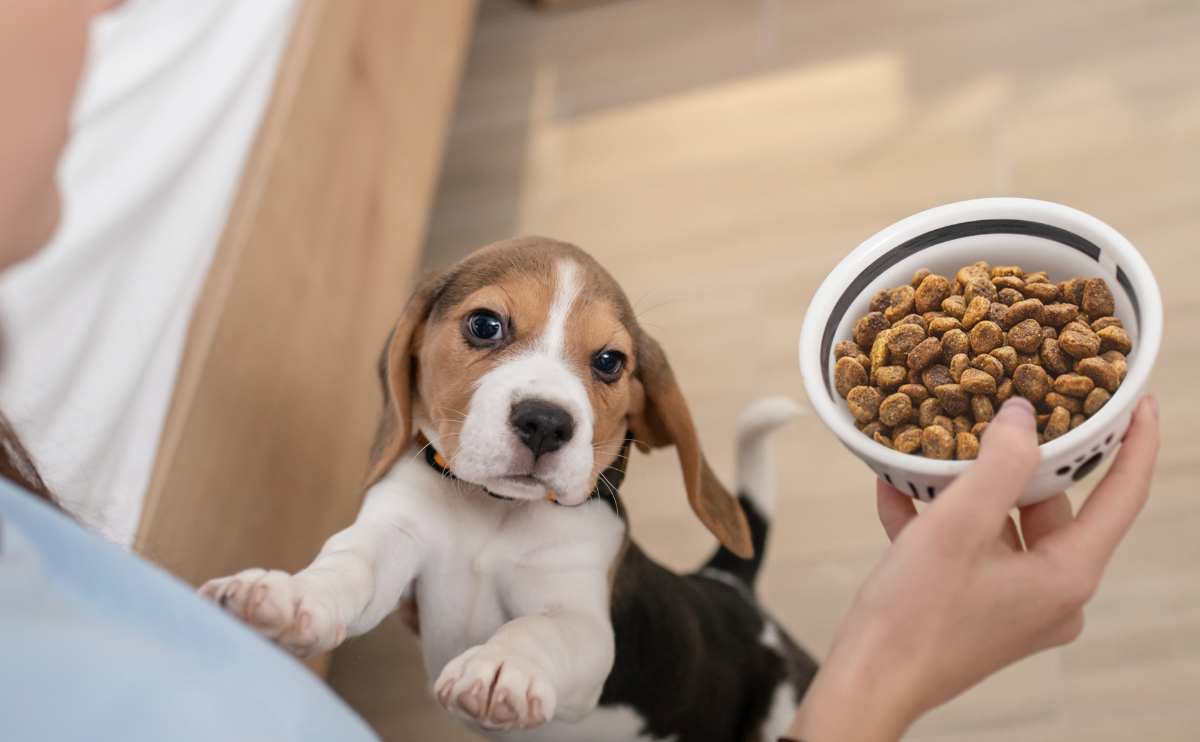
Switching a puppy to adult food isn’t a “one-size-fits-all” approach. It can vary based on your dog’s breed, age, and weight. I can help you determine when is the best time for you to switch your dog’s food and how to transition them successfully.
- How Long Should A Puppy Be On Puppy Food?
- What's The Difference Between Puppy & Adult Dog Food?
- What The Vet Says About Switching From Puppy To Adult Food
- Puppyhood Is The Best Time To Consider Pet Insurance
- When Can Puppies Eat Adult Food?
- How To Switch A Puppy To Adult Food
- How Often To Feed Your Dog
- Frequently Asked Questions
- Other Reasons For Changing Your Pup's Food
- Why Trust Canine Journal?
How Long Should A Puppy Be On Puppy Food?
In general, dogs are considered puppies if they are less than 1 year old. During this first year of life, they require a puppy-formulated diet to ensure they are getting the proper nutrients for growth. However, the time your dog needs to be on puppy food can vary based on your dog’s breed size.
What’s The Difference Between Puppy & Adult Dog Food?
Puppies require different nutrients and calories than adult dogs. Puppy-formulated foods typically have higher protein, fat, calcium, and phosphorus to help them grow. They also often include the omega fatty acid DHA, which is in their mother’s milk. Puppies are growing at a rapid rate. They use about 50% of their nutritional intake just to support that growth and development. A diet that does not contain enough of these essential elements can result in poor development, weak joint health, and digestive dysfunction.
Once your puppy is fully grown, they don’t need as many calories. If you continue to feed puppy food to an adult dog, it could result in your dog gaining excess weight or being prone to obesity.
The American Association Of Feed Control Officials (AAFCO) sets guidelines to determine what needs to be in dog food to provide a fully balanced diet. Below, I compare the different basic AAFCO recommendations for puppy vs adult formula dog food (based on dry matter). The AAFCO refers to dog food in two groups: growth and reproduction and adult maintenance (generally dogs one year and older).
| Growth & Reproduction | Adult Maintenance | |
|---|---|---|
| Crude Protein | 22.5% | 18% |
| Crude Fat | 8.5% | 5.5% |
| Calcium | 1.2% | 0.5% |
| Phosphorus | 1.0% | 0.4% |
| EPA & DHA | .05% | Not Determined |
You must also keep in mind that small breed dogs have different nutritional requirements than large breed dogs. Small and toy breed pups need nutrient-dense food and require more calories per pound of body weight than large and giant breeds.
Giant and large breed dogs need food with appropriate levels of calcium, phosphorus, and glucosamine to support bone and joint health. Not all puppy foods are created the same. If you have a very large or very small breed, it’s extra important to be sure you pick a food formatted to their size. This will work best to keep them at a healthy weight and support proper development.
What The Vet Says About Switching From Puppy To Adult Food
I spoke with Dr. Rebecca MacMillan, BVetMed BSAVA PGCertSAM MRCVS, to learn more about what a vet says about when it’s time to switch your puppy to adult chow. Here’s what she shared.
“The age at which you need to change your puppy onto an adult food varies according to their size. Puppy food is designed to support growth, with carefully balanced nutrients and higher amounts of energy than adult dog foods. Smaller breeds will finish their growth at an earlier age than large or giant breeds, who may take many more months to reach their full adult size. So, problems are most likely to arise if you switch a large or giant breed too soon (e.g. Great Dane, Rottweiler, or Newfoundland) as this could harm their development. Puppy diets for these breeds help to ensure they are not growing too rapidly and that they have the right balance of nutrients like calcium and phosphorus for bone development. It is important that continue receiving puppy food until they are mature.” Dr. Rebecca MacMillan
She continues,” You will know it is time to switch to adult food once your puppy has finished growing. For small breed dogs, this is around 12 months, medium dogs 12-18 months, large dogs 18-24 months, and giant dogs 24 months. Around these times, I also mention to owners that a puppy is likely to need to change diets if they start gaining excess weight (calories from high-energy puppy food are going into excess weight rather than growth) and if your puppy seems less hungry and is leaving meals.
“Just remember that when you switch to adult food, it must be done gradually by mixing the new diet into the old one over 5 – 7 days to avoid digestive upset. If you’re unclear when your breed has reached maturity, then it is always best to speak to your vet for advice,” adds Dr. MacMillan.
Puppyhood Is The Best Time To Consider Pet Insurance
As a puppy, your dog has probably not shown any significant health concerns at a young age. Since pet insurance companies do not cover pre-existing conditions, the younger your dog is when you sign up, the better coverage you will likely receive throughout their lifetime.
Further, pet insurance can help support you financially throughout your dog’s life, including the unpredictable puppy years when dogs are more likely to chew on things they shouldn’t and run into dangerous situations. Check out our pet insurance 101 guide to learn more and determine whether pet insurance is worth it for your puppy and get a quote below.
When Can Puppies Eat Adult Food?
Once your dog reaches a certain weight or age, you’ll need to transition to adult dog food. Below, I cover the general guidelines of when to switch your pup to adult food. Please note that these are rough estimates for weight and age. You should consult your vet to determine what’s best for your dog.
- Toy breeds (4 to 7 pounds at maturity): around 9 months old
- Small breeds (8 to 20 lbs at maturity): around 12 months old
- Medium breeds (21 to 50 lbs at maturity): around 12 months old
- Large breeds (51 to 85 lbs at maturity): 18 to 24 months old
- Giant breeds (more than 85 lbs at maturity): 18 to 24 months old
It’s best to ask your vet about your dog’s diet. And if you’re unsure about your dog’s breed, consider doing a canine DNA test.
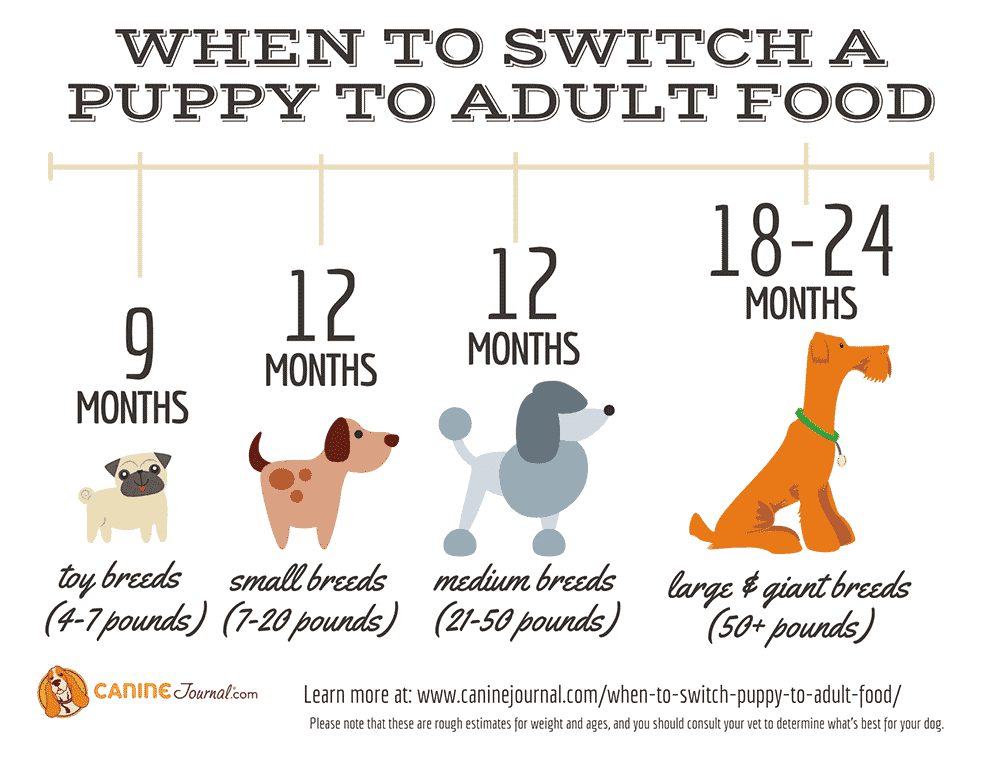
How To Switch A Puppy To Adult Food
When it is time to switch to adult food, make sure you do it slowly. You’ll want to transition over multiple days and watch for any upset stomach issues. To learn the correct way to adjust your dog’s diet, read our full article on how to change your dog’s food safely.
If you need ideas on which food is healthiest for your dog and most convenient for you, check out dog food delivery options, including fresh recipes from A Pup Above and The Farmer’s Dog. Fresh pet food companies make it easy to customize your dog’s diet based on age, weight, energy level, and diet. At-home delivery ensures you always have the next meal on hand.
How Often To Feed Your Dog
Puppies generally eat several small meals a day. They need this to replenish their calories and energy but also to make sure they eat enough and are able to digest their food properly. As adults, dogs should eat between two and three meals a day on average. Some breeds, including large breed dogs and small and toy breeds, may do better on three or four smaller meals throughout their lives.
- Large breed dogs – Try to eat three or four times a day.
- Medium-sized dogs – Two times daily is ideal, though some may do better with three.
- Small and toy breeds – These pups should have two meals every day. Again, some may prefer three. This does not mean you should feed them a larger amount of food. Simply divide their daily food intake by three meals instead of two.
Frequently Asked Questions
I know there are still plenty of questions about when to switch from puppy to adult foods. Below, I answer some of the most frequently asked questions, but if I missed yours, let me know in the comments.
When can a puppy start eating human food?
Puppies can eat select human foods in small doses when they reach about three months old. However, not all human foods are safe and must be prepared properly. Feeding your pup human foods isn’t recommended unless they are prepared specifically for your dog. Stay away from non-dairy milk and cow’s milk. These are hard to digest and may cause an upset stomach and diarrhea.
Can a puppy eat adult dog food?
If your puppy eats adult dog food rather than puppy-formulated chow, she won’t get the appropriate levels of nutrients, fat, or protein to develop properly. She also will be lacking in calories, meaning lower energy and slower growth. A poor immune system, allergies, persistent infections, slow wound healing, poor heart health, and other health issues can come from eating adult dog food during this period of rapid and essential growth.
Is puppy food softer or better tasting than adult food?
Most varieties of puppy kibble are softer than adult chows. They are also smaller in size, which helps protect the teeth from getting broken. Some adult kibbles are far too hard in texture for a puppy’s teeth to handle safely. As far as taste goes, that is hard to tell. Some dogs may like puppy food due to the higher fat content. Adult food has more variety and different flavors, so some dogs may prefer that.
Other Reasons For Changing Your Pup’s Food
One of the most significant switches in your pup’s food is the transition from puppy to adult formulas. You may also need to switch food if your dog is pregnant, has a food allergy, a sensitive stomach, digestive malfunctions, or has an underlying medical condition. You will also need to consider changing your dog’s food to a senior recipe when they reach about seven or so years old. It is always best to discuss any major dietary changes with your vet first. Be sure to take things slow as you transition your pup from one food to another to avoid stomach upset, pain, and bowel irregularity.
Why Trust Canine Journal?
Danielle is a pet owner with over 30 years of experience caring for pets with diverse medical needs. She has worked as a professional researcher for many years and is dedicated to providing the best research and information to help pet owners. Danielle spends countless hours researching the latest pet care, health, nutrition, and training developments. Danielle has tested and researched over 100 brands of dog food and counting with the help of her two canine taste testers, Daisy and Falkor. She works alongside a professional and experienced team to bring the best, most accurate, and up-to-date information to our readers.
Tagged With: Aging